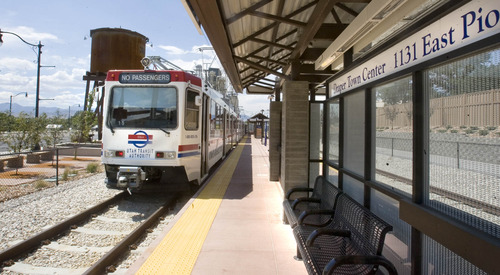This is an archived article that was published on sltrib.com in 2014, and information in the article may be outdated. It is provided only for personal research purposes and may not be reprinted.
Amid winter inversions, the Utah Transit Authority board was given some numbers Wednesday to show how much of a difference mass transit makes now to help clean air — and how much more might be done with additional funding and taxes.
UTA trains and buses take 120,000 cars trips a day off the road, saving 750,000 vehicle miles daily, the agency says. That saves 1,500 tons of emissions a year, UTA Chief Planning Officer Matt Sibul told the board's Planning and Development Committee.
"We are by far an emissions saver," when comparing pollution created by UTA trains and buses to what it saves by taking other vehicles off the road, Sibul said. "The question often comes up: Does UTA make a difference in what we do now?" He said it does.
Sibul notes that beyond just offering transit, UTA also is trying to help reduce air pollution by such things as starting to use natural gas-powered buses, imposing anti-idling rules, participating in the green bike-share program and working with Salt Lake City to offer discounted annual passes to its residents to increase ridership.
With a $75,000 sponsorship by Zions Bank, UTA also offered 4,000 free weekly passes last July on a first-come, first-served basis online. UTA has said they were used for about 20,000 boardings, which Sibul said eliminated an estimated 40,000 car trips and cut emissions by 2 tons.
Sibul noted that another similar free weekly pass program is planned for February.
Sibul said UTA could do much more if it manages to hit recent goals set by the UTA board to double its ridership by 2020.
He said that every day, that would take 250,000 cars trips off the road, save 2 million automobile miles traveled, and prevent 5 tons of serious pollutants.
To help double ridership, the board supports full-funding of the state's Unified Transportation Plan. UTA officials told the Legislature last year that funding mass transit portions of that plan would require raising sales taxes for transit to about 1 cent per dollar purchase — 67 percent higher than the current average of 0.6 cents per dollar.
However, UTA spokesman Remi Barron has said, "UTA has not sought out any legislation seeking an increase in the sales-tax cap. Rather, UTA sees its role ... as one of listening to the community through its elected representatives and providing them with information. For this reason, we support Utah's Unified Transportation Plan."
Still, Rep. Joel Brisoe, D-Salt Lake City, has said he is drafting legislation to allow that tax increase to 1 cent per dollar for transit, saying that air-pollution problems cannot be solved without it. He has said it could be a tough sell in this election year, when lawmakers normally are hesitant to raise taxes.



